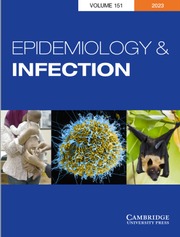Crossref Citations
This article has been cited by the following publications. This list is generated based on data provided by
Crossref.
Schlumberger, Hans G.
1958.
Pathologie der Laboratoriumstiere.
p.
1514.
Favour, C. B.
1958.
COMPARATIVE IMMUNOLOGY AND THE PHYLOGENY OF HOMOTRANSPLANTATION.
Annals of the New York Academy of Sciences,
Vol. 73,
Issue. 3,
p.
590.
ENGLE, RALPH L.
and
WOODS, KENNETH R.
1960.
The Plasma Proteins.
p.
183.
Evelyn, T. P. T.
and
McDermott, L. A.
1961.
BACTERIOLOGICAL STUDIES OF FRESH-WATER FISH: I. ISOLATION OF AEROBIC BACTERIA FROM SEVERAL SPECIES OF ONTARIO FISH.
Canadian Journal of Microbiology,
Vol. 7,
Issue. 3,
p.
375.
BRAMSTEDT, FRITZ
and
AUERBACH, MARGARETHE
1961.
Fish As Food.
p.
613.
Alcock, Doris M.
1965.
Antibody production in the common frog, Rana temporaria.
The Journal of Pathology and Bacteriology,
Vol. 90,
Issue. 1,
p.
31.
Nace, George W.
Suyama, Tadakazu
and
Iwata, Takuzo
1965.
THE RELATIONSHIP BETWEEN A LYSOZYME‐LIKE ENZYME AND FROG ADENOCARCINOMA*.
Annals of the New York Academy of Sciences,
Vol. 126,
Issue. 1,
p.
204.
Sindermann, Carl J.
1966.
Advances in Marine Biology Volume 4.
Vol. 4,
Issue. ,
p.
1.
Bråten, Trond
1966.
Host specificity in Schistocephalus solidus.
Parasitology,
Vol. 56,
Issue. 4,
p.
657.
Cushing, John E.
1970.
The Nervous System, Circulation, and Respiration.
Vol. 4,
Issue. ,
p.
465.
Eskin, N.A.M.
Henderson, H.M.
and
Townsend, R.J.
1971.
Biochemistry of Foods.
p.
1.
Hawkins, Rosemary I.
and
Mawdesley‐Thomas, LionelE.
1972.
Fish haematology‐A bibliography.
Journal of Fish Biology,
Vol. 4,
Issue. 2,
p.
193.
Harris, J. E.
1973.
The immune responses of dace Leuciscus leuciscm (L.) to injected antigenic materials.
Journal of Fish Biology,
Vol. 5,
Issue. 2,
p.
261.
Corbel, M. J.
1975.
The immune response in fish: a review.
Journal of Fish Biology,
Vol. 7,
Issue. 4,
p.
539.
Ingram, G. A.
1980.
Substances involved in the natural resistance of fish to infection–A review.
Journal of Fish Biology,
Vol. 16,
Issue. 1,
p.
23.
Alexander, B.
and
Austin, B.
1986.
Bacterial microflora associated with a commercial fish smoker.
FEMS Microbiology Letters,
Vol. 34,
Issue. 3,
p.
309.
Tarnecki, Andrea M.
Patterson, William F.
and
Arias, Covadonga R.
2016.
Microbiota of wild-caught Red Snapper Lutjanus campechanus.
BMC Microbiology,
Vol. 16,
Issue. 1,
Rodenas, María C.
Cabas, Isabel
Gómez-González, Nuria E.
Arizcun, Marta
Meseguer, José
Mulero, Victoriano
and
García-Ayala, Alfonsa
2017.
Estrogens Promote the Production of Natural Neutralizing Antibodies in Fish through G Protein-Coupled Estrogen Receptor 1.
Frontiers in Immunology,
Vol. 8,
Issue. ,
Tarnecki, Andrea M.
Rhody, Nicole R.
and
Walsh, Catherine J.
2018.
Health Characteristics and Blood Bacterial Assemblages of Healthy Captive Red Drum: Implications for Aquaculture and Fish Health Management.
Journal of Aquatic Animal Health,
Vol. 30,
Issue. 4,
p.
339.


